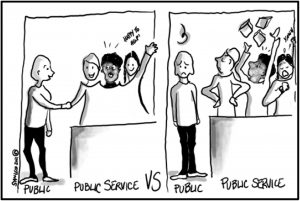Staying motivated: A life course analysis of the career paths of Canadian public servants
WHAT IS THE STUDY ABOUT?
All Canadians benefit from a high quality of public service delivery, which is directly related to the motivation of public servants. A motivated public sector workforce enhances performance (Ritz, 2009) and the quality of public service delivery (Taylor, 2007) and thereby increases the benefits to society, as illustrated in the graphic.
high quality of public service delivery, which is directly related to the motivation of public servants. A motivated public sector workforce enhances performance (Ritz, 2009) and the quality of public service delivery (Taylor, 2007) and thereby increases the benefits to society, as illustrated in the graphic.
The Public Service Motivation (PSM) theory offers a framework for the analysis of motivations of public servants, but the framework is static. A critical gap in our knowledge is how motivations of public servants change over time and are shaped by the life-course dynamics of identifies, roles, inequalities, and experiences.
Our goal is to chronicle the motivations of individuals over a life course, specifically from the onset of their career in the public service to their current career stage. We will contribute to PSM theory by combining it with the Life Course Theory (LCT). This will allow for the analysis of change in PSM over time and in relation to other life events. We aim to further our understanding of determinants of motivation of public servants by unveiling the dynamic, gendered, and diverse nature of PSM, and its interconnections with professional and personal lives.
POTENTIAL BENEFITS OF THIS STUDY
The novel combination and flexibility of the PSM/LCT combined framework can be used to study motivation across a broad range of services and industries. For example, the new framework to the study of motivations of health professionals.
Our study will also pave the empirical way in the use of admissions letters as artifacts on which to focus reflexive qualitative interviews.
Our results will inform two sets of institutional policies. First, they will influence training of public servants via the impact on graduate-level academic programs in Canadian institutions. Our direct involvement in the shaping of curricula and professional development events will rely on new knowledge gained regarding the determinants of motivations and changes in motivations of future public servants (our students). Second, they will influence human resources policies in Canadian governments. The results have a high probability of being considered by policy makers, given the focal role of the study participants in developing recommendations with critical policy implications.
RESEARCH TEAM

Dominika Wranik

Maude Boulet

Isabelle Caron

Linda DeRiviere

Sara Filbee

Joan Grace

Rosemary McGowan

Catherine Kennedy
PROJECT UPDATES AND NEWS
FUNDERS





